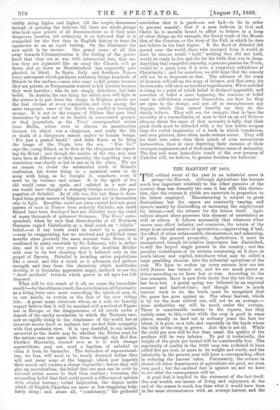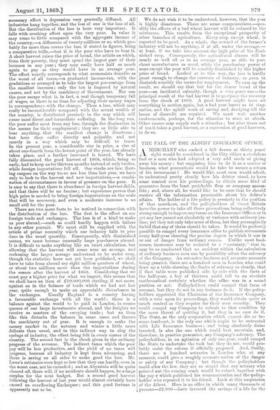THE HARVEST OF 1869.
THE critical event of the year in an industrial sense is= alwaysthe Harvest. Although Agriculture has become- much less important relatively to the other pursuits of the- country than was formerly the case, it has still this distinc- tion, that the returns it yields are uncertain in proportion to labour employed. Manufacturing is subject to great fluctuations, but the causes are constantly varying, and operate mainly by diminishing or increasing the employment for labour,—not the returns for the labour itself. Agri- culture almost alone possesses this element of uncertainty as well as others. It follows necessarily that whatever other causes may affect industry and commerce, the return of the- crops is an annual matter of speculation,—aggravating, if bad, the effect of other unfavourable circumstances, and enhancing, if good, the general prosperity. Agriculture, it must be- remembered, though its relative importance has diminished, is still the largest single pursuit in the country ; and the- peculiar variableness of its returns, concerning, as it does, so- much labour and capital, introduces what may be called a large gambling element into the industrial operations of the year. We have to reckon up every autumn how our bet with Nature has turned out, and we are much poorer or richer according as we have lost or won. According to the best accounts, there is now little doubt that the bet this year has been lost. A genial spring was followed by an ungenial summer and harvest-time ; and though there is much harvest work to do, the truth must be . recognized that the game has gone against us. The wheat harvest, which is by far the most critical one, will not be an average,— some authorities say will be much under the average.. There is considerable variety in the reports, but they- mainly come to this,—that while the crop is good in some- places, usually on land not in ordinary years the best for wheat, it is poor, as a rule, and especially on the lands where the bulk of the crop is grown. And this is not all. While- the yield per acre will be less than usual, the quality of the produce will be very inferior. To put it technically, the- weight of the grain per bushel will be considerably less. The superiority of quality in the 1868 crop was reckoned to have added five per cent. or more to its weight and worth, and the inferiority in the present year will have a corresponding effect in reducing the harvest value. Fortunately, the returns in almost all other departments of agriculture are good, are even very good ; but the cardinal fact is against us, and we have to see what the consequences will be.
A good deal is implied in the statement of the fact itself. Our real wealth, our means of living and enjoyment, at the end of the season is much less than what it would have been in the same circumstances with an average harvest, and the
necessary effect is depression very generally diffused. All industries hang together, and the loss of one is the loss of all. But the distribution of the loss is here very important. It falls with crushing effect upon the very poor. In value it may come to little compared with the aggregate income of the country,—a difference of twenty millions or so, which pro- bably far more than covers the loss, if stated in figures, being a comparative trifle, but it is the poor who have to bear it. A short harvest raises the price of bread, the article on which, from their poverty, they must spend the largest part of their incomes in any year ; they may easily have half as much again to pay as they would have in an average year. The effect exactly corresponds to what economists describe as the worst of all taxes,—a graduated income-tax, with the gradations so arranged as to take the largest per-tentage from the smallest incomes ; only the tax is imposed by natural causes, and not by the machinery of Government. Nor can the poor escape what is, in fact, a real though temporary fall of wages, as there is no time for adjusting their money wages in correspondence with the change. Thus a loss, which may really be inconsiderable compared with the actual wealth of the country, is distributed precisely in the way which will cause most direct and immediate suffering. In the long run, the poor suffer most from any loss, through the diminution in the means for their employment ; they are so little able to bear anything, that the smallest change is disastrous ; but here they suffer directly and palpably, and not merely in a way which may be difficult to trace. In the present year, a considerable rise in price, a rise of about one-fourth from the lowest point of the year, has already taken place, and a further increased is feared. We have fully discounted the good harvest of 1868, which, being so early, had to keep us for thirteen months instead of only twelve, while foreign importations fell off. Our stocks are low, float- ing cargoes on the way to.us are less than last year, we have only to look to the harvest and new importations,—a combi- nation of circumstances in favour of pressure on the poor. It is easy to say that there is abundance in foreign harvest-fields, and that there will be no famine ; but experience proves that high price is needed to bring foreign importations on the scale that will be necessary, and even a moderate increase is no small evil for the poor. There are two more facts to be noticed in connection with the distribution of the loss. The first is the effect on our foreign trade and exchanges. The loss is of a kind to make us poor abroad,—such as could hardly happen with failure in any other pursuit. We must still be supplied with the article of prime necessity which our industry fails to pro- duce in the usual quantity. Consequently, with diminished means, we must become unusually large purchasers abroad. It is difficult to make anything like an exact calculation, but allowing that the harvest will come near an average, and reckoning the larger acreage understood to be under crop, though the statistics have not yet been published, we shall have to take from abroad say eight million quarters of wheat, or about two millions more than the importations during the season after the harvest of 1868. Considering that we must pay a higher price for what we import, this means that we shall have an item of £10,000,000 sterling, if not more, against us in the balance of trade which we had not last year, quite enough to make an appreciable disturbance in the exchanges. Usually England is a country having a favourable exchange with all the world ; there is a balance against the world to be paid in London, in conse- quence of our large investments abroad, and the freights we receive as masters of the carrying trade ; but an item like this disturbs the balance in some cases and throws the machinery out of gear. It is enough to make the money market in the autumn and winter a little more delicate than usual, and in this indirect way to clog the springs of industry, the effect being felt in every corner of the country. The second fact is the check given to the ordinary progress of the revenue. The indirect taxes which the poor pay will be less productive, and the yield of no taxes will progress, because all industry is kept from advancing, and there is saving on all sides to make good the loss. Mr. Lowe's estimates were kept so low that they can hardly, even in the worst case, not be exceeded ; and as Abyssinia will be quite cleared off, there will, if no accidents should happen, be a large surplus for the next budget. But a second good harvest following the harvest of last year would almost certainly have caused an overflowing Exchequer ; and this good fortune is apparently not to be. We do not wish it to be understood, however, that the year is highly disastrous. There are some compensations,—pos- sibly the effects of a bad wheat harvest will be reduced to the minimum. This results from the exceptional prosperity of other branches of agriculture. Every crop, except wheat, is reported to be good. As a whole, the reward of the farmer's industry will not be anything, if at all, under the average,— at least, if we take into account the high price of his dimi- nished crop. Consequently, the agricultural classes will be nearly as well off as in an average year, as able to pur- chase manufactures as usual, while the purchasing power of none except the poor will be sensibly diminished by the higher price of bread. Looked at in this way, the loss is hardly great enough to change the currents of industry, or _even to diminish sensibly the means for employment. To sum up the result, we should say that but for the dearer bread of the poor—an incidental calamity, though a very grave one—the principal result of the bad harvest is to postpone the recovery from the shock of 1866. A good harvest might have set everything in motion again, but a bad year leaves us to stag- nation, and the uphill work of saving and drudging.till the losses of discredit are repaired. We must wait another twelvemonth, perhaps, for the stimulus to start us afresh. Other causes may supply such a stimulus ; but nine times out of ten it takes a good harvest, or a succession of good harvests, to do so.































 Previous page
Previous page